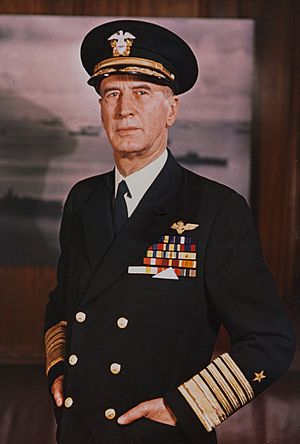Ernest King facts for kids
Quick facts for kids
Ernest J. King
|
|
|---|---|

Fleet Admiral Ernest J. King, USN
|
|
| Nickname(s) | "Ernie" "Rey" |
| Born | 23 November 1878 Lorain, Ohio |
| Died | 25 June 1956 (aged 77) Kittery, Maine |
| Buried |
United States Naval Academy Cemetery
|
| Allegiance | |
| Service/ |
|
| Years of service | 1901–1956 |
| Rank | |
| Commands held | Chief of Naval Operations United States Fleet United States Atlantic Fleet USS Lexington Naval Station Norfolk USS Wright USS Bridge Naval Postgraduate School USS Terry |
| Battles/wars | Spanish–American War Mexican Revolution World War II |
| Awards | Navy Cross Navy Distinguished Service Medal (3) |
| Other work | President, Naval Historical Foundation |
Ernest Joseph King (born November 23, 1878 – died June 25, 1956) was a very important leader in the United States Navy. During World War II, he was the Commander in Chief of the United States Fleet. He also served as the Chief of Naval Operations, which meant he was in charge of all Navy plans and actions.
King was a member of the Joint Chiefs of Staff. This group helped the President make big military decisions. He was the second-highest-ranking Navy officer during World War II.
Contents
Ernest J. King was a key figure in the U.S. Navy. He helped lead the Navy through some of its toughest times. His leadership was very important during World War II. He made sure the Navy was ready for battle.
Ernest King was born in Lorain, Ohio. Even as a student, he began his Navy service. He took part in the Spanish–American War while attending the United States Naval Academy. This was his first experience in a real conflict.
In 1914, King received his first command. He led the destroyer USS Terry. This ship was involved in the occupation of Veracruz in Mexico.
Rising Through the Ranks
During World War I, King worked for Vice Admiral Henry T. Mayo. Mayo was the commander of the United States Atlantic Fleet. After the war, King continued to advance.
He became the head of the Naval Postgraduate School. He also commanded a group of submarines. Later, he served as the Chief of the Bureau of Aeronautics. This role put him in charge of naval aviation. In February 1941, King became the commander of the Atlantic Fleet.
King's biggest role came during World War II. Shortly after the Japanese attack on Pearl Harbor, he was given a huge responsibility. He was named Commander in Chief of the United States Fleet. This meant he was in charge of all U.S. Navy ships and forces.
Commander in Chief of the Fleet
In March 1942, King took on another major role. He became the Chief of Naval Operations. This made him responsible for planning and running all Navy operations. He was now in charge of both the fleet and the Navy's overall strategy.
Becoming Fleet Admiral
In December 1944, Ernest King received a very high honor. He became the second admiral in U.S. Navy history to be promoted to fleet admiral. This is a five-star rank, showing his great importance.
King left active duty in December 1945. He passed away in 1956. His leadership helped the U.S. Navy achieve victory in World War II.
Images for kids
-
Fleet admiral King arrives at the Potsdam Conference in July 1945.
See also
 In Spanish: Ernest J. King para niños
In Spanish: Ernest J. King para niños
 | Charles R. Drew |
 | Benjamin Banneker |
 | Jane C. Wright |
 | Roger Arliner Young |






